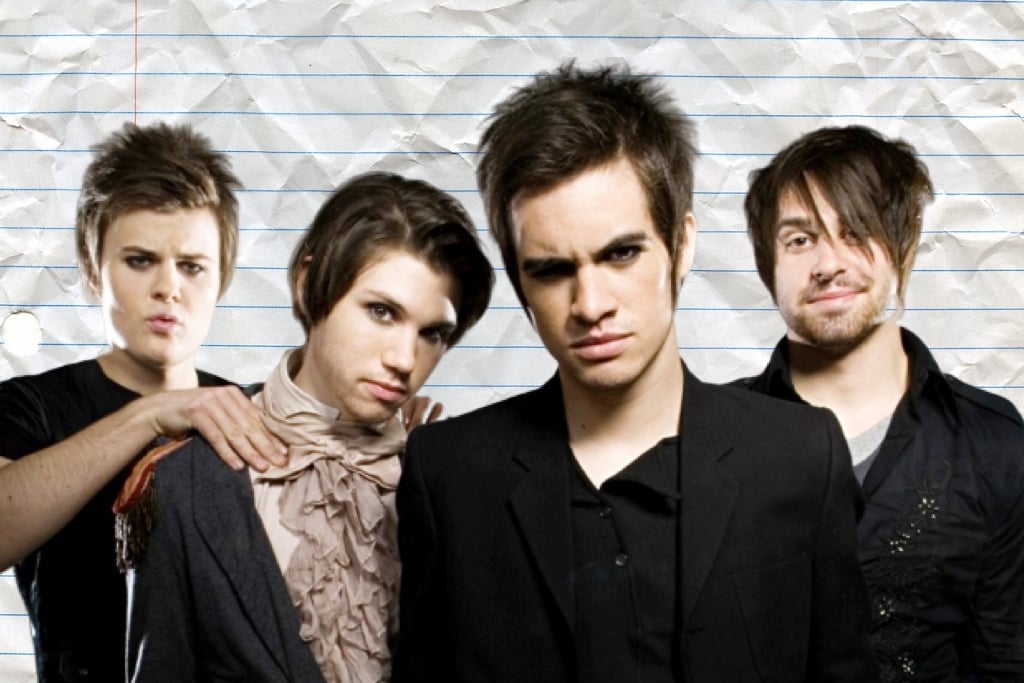Fall Out Boy’s ‘From Under The Cork Tree’ Was The Best And Very Worst Of Emo
'From Under The Cork Tree' was a musical masterpiece, but it was also a prime example of the genre's toxic misogyny.

In 2004, Fall Out Boy were at risk of becoming emo also-rans.
Their debut Take This To Your Grave had made them Tumblr famous and had earned them ‘next big thing’ taglines, but their contemporaries were either writing better pop hooks (‘You Know What They Do To Guys Like Us In Prison’) or dialling up the angst to eleven (‘Let It Bleed’). Fall Out Boy, meanwhile, were filling out the tracklists of iPod playlists with cute but forgettable tales of boredom in middle-class suburbia (‘Grand Theft Autumn’ and ‘Saturday’).
There was also the issue of image. The emo scene represented a subversion of the clean-cut and sugar-sweet pop music juggernaut that had ruled since the back street came back (alright), and a key part of that relied on an element of danger. AFI and I Killed The Prom Queen were ~edgy~ and were fronted by someone you wouldn’t dream of bringing home to your Mum and Dad.
The problem with Fall Out Boy was that singer Patrick Stump looked exactly like your Dad and wore the same three-quarter shorts. But what Fall Out Boy lacked in typical semiotic emo-culture they made up for with their acid-tongued bassist and lyricist Pete Wentz.
The scene already had its share of quick-witted songwriters, with Motion City Soundtrack leading the pack with their talent for articulating masochism and self-loathing in its most tongue-in-cheek futility. But what Pete brought was a focused and almost unholy obsession with the opposite sex. It was because of his pen that Fall Out Boy’s second album From Under The Cork Tree, despite its wholesome children’s book referencing title, became the sound of irrepressible, inescapable, and suffocating hormones taking over.
From Under The Cork Tree was the sound of irrepressible hormones taking control, and the feeling of being inescapably and suffocatingly horny.
This would be the album that took the Chicago boys from the Warped Tour to the MTV Music Awards; its widespread appeal and success came from Stump’s flair for taking classic rock melodies and repurposing them for turn of the century teenagers. At its heart, From Under The Cork Tree is a power pop album; with Cheap Trick, T-Rex and even Journey in its DNA. Stump just added distortion and paired it with Wentz’s myopic worldview in an ingenious melodic sleight of hand.
To quote a throwaway Australian indie band from the same era, the “do-do’s and whoa-oh’s” were FOB’s key to finding the goldilocks zone between the aggressive edge of their peers and the easily accessible pop-punk anthems that would make them the biggest stadium rock stars of their genre before The Black Parade rolled in a year later.
The album’s first two singles, ‘Sugar, We’re Going Down’ and ‘Dance, Dance’ epitomised this balance, with the band framing themselves in an American Pie setting — where it’s always graduation year and you might just be getting lucky on prom night. But along with the corsages and house parties with unknown liquids in red cups came an inner monologue that revelled in its own melodrama, with voices saying things like “This is the way they’d love if they knew how misery loved me” with all the conviction of someone lost in their own downward spiral.
And for many, including this writer, that was part of the album’s morbid attraction. Some lyrics sounded like a cry for help, and it wasn’t a coincidence that much of it was written in the shadow of Wentz’s own suicide attempt and recovery in early 2005.
But the tragedy of the album’s circumstances underscored the surprising levity in which the subject matter is treated — they bandy about impossibly long song titles that are flippant enough to make a pun out of the drug Wentz OD’d on, and also throwback to the classic romanticism of Casablanca and the John Hughes inspired schmaltz of Sixteen Candles.
And while you’d typically expect an album like this to wallow in its own self-indulgence, Wentz’s own introspective anxiety-analysis is for the most part sidelined by his voyeurism of “the little bit of spine you’ve been saving for his mattress.”
Desire, Autonomy, And Safety
And this introduces a new and altogether different criticism of the album. Much of From Under The Cork Tree leverages the sympathetic point of view of other males in pursuit of the protagonist’s desire at the expense of the (always faceless/anonymous) female’s autonomy and safety.
“I’ll be your best kept secret and your biggest mistake” might be a typical thought rooted in self-deprecating teenagers’ minds, but sitting so close to a lyric like “so wear me like a locket around your throat, I’ll weigh you down, I’ll watch you choke, you look so good in blue…” it becomes impossible to defend against accusations of incitement.
It’s exactly this dichotomy between entitled-male and unwilling-female that made the genre one of the many genesis points for the incel community and an accelerant for rampant misogyny in music.
Fall Out Boy were far from the genre’s worst offenders, but they were largely complicit in its culture with lyrics such as “I only want you showing sympathy in the form of you crawling into bed with me” and “oh don’t mind me, I’m watching you two from the closet wishing to be the friction in your jeans” that so obviously sow the seeds of displaced and deluded injustice in men to see themselves as the victim and the unwitting female as the perpetrator of imaginary wrongs.
“…loving it through a mature lens is more difficult as you trace its legacy through the minefield of latent misogyny many of its wannabe imitators left behind.”
It doesn’t help that Wentz’s songwriting is so damn descriptive and visual that lyrics such as “the way your makeup stains my pillowcase” paint vivid scenes of intimacy and vulnerability. But while lines such as “I don’t want to forget how your voice ends” sound impossibly sweet with hints of Shakespearean devotion, others such as “through the keyhole as I watched you dress, kiss and tell, loose lips sink ships” sound positively sinister and are emblematic of an elephant in the room now too large to ignore.
You can try to explain a lot of this away to the naivety of youth and the blur between obsession and love that only comes with puberty when you’re pining after your crush. But while Wentz and co. were writing for the acne-ridden kids who perhaps didn’t know any better, Pete was twenty-six and definitely should have.
Brilliantly witty quips like “I’m just a notch in your bedpost but you’re just a line in a song” are still god-level burns, but in 2020 they now also reek of the passive-aggressive hallmarks of a scene that all too regularly treated their sexual targets as props in a film played out in their head.
Tension In The Heart
This is not a pitchfork-waving exercise to retroactively cancel Fall Out Boy under the glaring light of wokeness. And Wentz’s razor-sharp tongue would soon move onto different targets, including ironically, the tribalism of the emo scene itself.
But it’s a worthy exercise to look more critically at a scene that for too long was given carte blanche to say whatever they wanted without question. And while artistically, that’s not necessarily a bad thing, it can be when 99 percent of those voices are male, heterosexual and white. The tension inherent in emo music is what brought the millions of fans to their music, but it’s that exact tension that created a tightrope between emotional exorcisms and narcissistic gaslighting. And if you don’t believe me, go listen to Taking Back Sunday’s absolute banger ‘MakeDamnSure’ and tell me it’s not wobbling on that tightrope.
From Under The Cork Tree remains a pop-punk masterpiece in its form. In 2005 it was the comeback of the year and not the sophomore slump Wentz feared so deeply. But loving it through a mature lens is more difficult as you trace its legacy through the minefield of latent misogyny many of its wannabe imitators left behind.
Chris Lewis is a writer and critic based in Melbourne. He is on Twitter.
All this week, Music Junkee is tumbling down memory lane and exploring everything to do with the emo. Get stuck in here.

